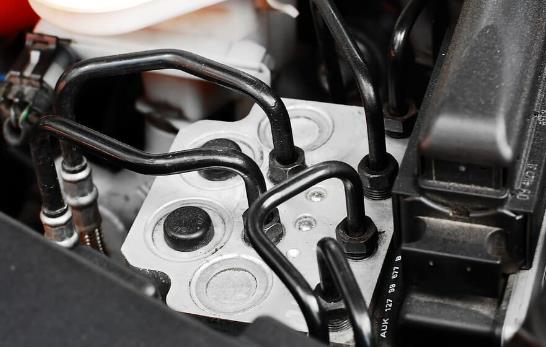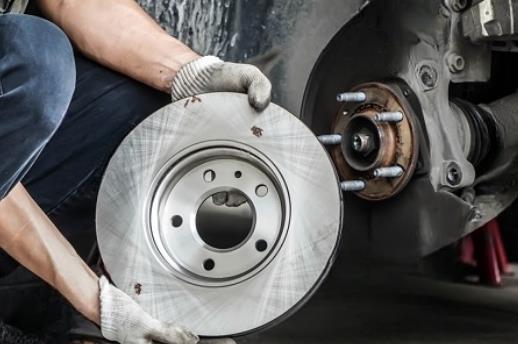Is It Legal To Disable ABS Brakes? All You Need To Know
As a car owner, you may encounter numerous circumstances where you must repair any issues or defects with your priceless equipment. Let’s face it: Only some are gifted with the ability to comprehend the intricate workings of our car. Do not be concerned; I am here to assist you to know about Is It Legal To Disable ABS Brakes?
Let me clarify this by stating some facts for those asking how to repair your car’s anti-lock braking system. To learn more about anti-lock brakes, let’s take a quick look at what they are and how they work before moving on.
Is It Legal To Disable ABS Brakes?
No, it is illegal to turn off the ABS brakes. A safety system can only actually be removed by raising the risk.
Is my automobile safe to drive without an ABS module? It is feasible for you to operate your vehicle without the ABS Module, but you must exercise caution.

What Are Anti-Lock Brakes?
The safety anti-skid braking system, known as anti-lock brakes or ABS, is fitted in various vehicles, including cars, buses, lorries, and motorcycles.
When braking suddenly, it keeps the car from locking up, allowing it to retain tractive force between the road and the car.
It enables the driver to maintain good control of their car in emergencies, chaotic driving, or hard braking situations.

The anti-lock braking system, or ABS, is primarily designed to prevent the vehicle from skidding when the driver applies the brakes.
Your car’s wheels may lock if you hit the brakes forcefully while moving at a high rate of speed. The car loses adhesion due to the wheel locking, and you risk losing steering control. But thanks to ABS, you won’t have to deal with this issue any longer.
Will Brakes Still Work Without ABS?
Without ABS, brakes still operate, but they are less safe and less effective when braking hard. Extreme caution is required without ABS brakes, especially in hazardous weather conditions.
Under normal circumstances, the brakes will continue to work normally, but you’ll notice the difference if you need to brake forcefully.
Whereas before you could jam on the brakes without worrying about a lock-up, this becomes more of a challenge without ABS.

You can still drive without ABS, but you’ll have to squeeze the brake pedal rather than stomping on it. The wheels may begin to lock up if you need to stop quickly and your ABS brakes aren’t working.
You must release the brakes and apply them again for the wheels to regain traction. In an emergency, this is known as “pumping the brakes” and is a challenging technique to perfect.
Is Driving Without ABS Safe?
The driver’s expertise will determine if a vehicle is secure to operate without ABS. Younger drivers might not know how to properly reduce the speed of a non-ABS automobile in an emergency.
Since anti-lock brakes are standard in all current vehicles, drivers are no longer instructed to ‘pump the brakes’ when the wheels lock up. In the past two decades, cars have advanced significantly.
As a result of their prior experience, drivers who did not grow up with anti-lock braking systems (ABS) will be better prepared to operate a vehicle equipped with conventional brakes in the modern world.
In addition to lacking ABS, a car without ESC, another safety feature of current cars, will also lack electronic stability control (ESC).
Is ABS A Legal Obligation?
All new cars are legally required to have anti-lock brakes, but owners of older vehicles that didn’t come equipped with them are not required to install them.
Manufacturers must install anti-lock brakes to sell their automobiles in the USA, EU, UK, and many other countries; ABS brakes are only required by law on new vehicles.
Older automobiles that weren’t equipped with ABS out of the factory are exempt, yet many individuals still drive these cars nowadays.
Is It Illegal To Drive Without An ABS?
Although it is not strictly against the law to drive without an anti-lock braking system if one has failed, you might need to have it repaired to pass your nation’s annual roadworthiness test.
Since your brakes would still function as if ABS hadn’t been installed, it’s generally not illegal to drive if your ABS fails.
Before taking your automobile in for its yearly inspection, ensure the problem is rectified as quickly as possible.
Most nations demand safety measures installed from the start to be in perfect functioning condition to pass inspections.
It’s conceivable that your insurance provider would decline to pay out on your claim if you were to get into an accident and you had been driving willfully without the ABS functioning.
If this occurs, you might end up with a sizable cost. Without ABS brakes, you have a higher risk of being involved in an accident.
Is It Permitted To Turn Off ABS Brakes?
Disabling ABS brakes is controversially legal. If the ABS brakes were deliberately disabled and the car was involved in an accident, it might be argued that this would be considered criminal negligence.
Owners of cars may find it challenging (and occasionally impossible) to turn off the ABS, but it is feasible. Turning off any safety system is a contentious decision that will help you stop your car safely in an emergency.
Some automobile owners turn off their anti-lock brakes to diagnose problems temporarily. Still, we’d recommend exercising caution and avoiding driving on public roads while the brakes are turned off.
If you were in a collision, not only would your insurance provider have something to say about it, but the police would also want to know why you deliberately deactivated a system meant to save lives.
According to certain reports, police departments have pushed for convictions in this situation.
When Were ABS Brakes Made Necessary?
Since September 1, 2013, all new cars sold in the USA must have ABS brakes. Anti-lock brake technology was made mandatory in the EU far sooner than in the USA in 2004.
Although ESC has been a requirement for all new automobiles since 2007, the USA lagged behind its European counterparts regarding ABS.
But even before it was required, automakers had long used ABS while designing their vehicles.
Since the 1990s, it has been widely used because of its obvious safety advantages for drivers, passengers, and pedestrians.
Is ABS Braking Required?
Modern automobiles must have ABS brakes. The car is significantly safer and has a much lower probability of being in a serious collision when it has ABS brakes.
One of the best safety features added to automobiles in recent years, anti-lock brakes have helped to save many lives.
One of the most important aspects of a vehicle’s safety is its brakes; thus, any technology that may increase its efficiency is much appreciated.
In an emergency, managing your car will be more challenging if you’re driving one without ABS.
Under normal circumstances, braking technique can always be practiced, but caution must be exercised when driving without ABS brakes.
How Can Problems Be Avoided If The ABS Fuse Is Taken Out?
It’s critical to take precautions to ensure your brakes continue functioning properly if you remove the Anti-Lock Brake System (ABS) fuse.
A manual braking system can be used in place of the ABS as one approach to do this. Thanks to this, you will still be in charge of when and how forcefully you apply the brakes.
A manual braking system does not always have the same protection against leaks or other problems that an ABS offers.
Thus, it is necessary to check your brake fluid levels regularly. You should also modify your driving technique to make the manual braking system as effective as possible.
Finally, it’s important to do routine brake maintenance, which involves checking the condition of your brake rotors and pads and replacing them as needed.
By taking these safety measures, you can ensure that even if the ABS fuse has been removed, you still have control over your car.
How Is The ABS Fuse Replaced?
If you’ve decided that the ABS fuse needs to be changed, following the right procedures to accomplish it safely is crucial.
First, ensure the car is completely disabled and unplug the negative battery cable. By doing this, you’ll assist in avoiding any electrical harm or shock when changing the ABS fuse.
Locate and enter the fuse box for your car, which should be labeled “ABS” after it has been disconnected.
Usually, one of the larger fuses in the box will be the ABS fuse. Before replacing this fuse, it’s crucial to refer to a schematic for the make and model of your specific vehicle.
You’ll need a set of needle-nose pliers or something similar to get the ABS fuse out of the box. Find an ABS fuse with the same size and rating as those listed on the old fuse and install it.
Then, ensure the replacement fuse is firmly placed into its corresponding slot in the fuse box.
To see if the ABS is working properly again, reconnect the negative battery cable and start your car. If not, contacting a trustworthy car mechanic for more help is crucial.
It is advised to take the appropriate safety precautions when changing an automobile’s ABS fuse.
When working with electrical components, always use safety goggles and gloves, and always seek professional advice or consult your car’s manual before starting any repairs.
You may safely replace the ABS fuse in your automobile and get back on the road by following the right procedures. It should not be done because doing so could cause further harm or damage.
By taking the appropriate safety precautions and correctly changing an ABS fuse, you can be sure that your car will run smoothly for many miles to come.
Conclusion
To conclude, Is It Legal To Disable ABS Brakes? Removing the ABS fuse to resolve an ABS light quickly may be tempting, but doing so may worsen brake problems.
It is best to have your anti-lock brakes diagnosed by a qualified mechanic as soon as possible if you believe there is a problem. To ensure your safety while driving, a mechanic can identify and fix any problems with your ABS.
Disconnecting the ABS fuse must only be done in dire circumstances and under the watchful observation of a qualified professional. When it comes to your braking system, don’t take any chances; get professional guidance before starting any repairs!
Top FAQ’s
What occurs if the ABS is turned off?
Without an ABS, stopping in an emergency could be more difficult when you need to apply the brakes quickly and forcefully. Due to the lack of ABS, you won’t have any additional help maintaining control of your vehicle while you attempt to slow down quickly, which could raise your risk of an accident.
Can you drive with the ABS turned off?
Your car’s brakes are one of the most crucial components, and they are made to function even if the ABS fails. So, even without ABS, your automobile will still be able to stop. But if your vehicle has ABS, it’s advised to drive with it.
What will happen if I pull the fuse for my ABS?
The ABS will cease to function whenever the fuse is removed or blown. You anticipate your tires locking up due to this and the ABS warning light turning on at the dashboard. Your braking distance increases even though your brakes continue to function normally because emergency braking makes it more difficult to maneuver your car.
Is stopping faster without ABS?
The car with ABS will always stop more quickly than the vehicle without ABS.

Welcome to the exhilarating world of Matt Rex, a professional car racer turned renowned vehicle enthusiast. Immerse yourself in his captivating blog as he shares heart-pounding adventures, expert reviews, and valuable insights on cars, trucks, jets, and more. Fuel your passion for speed and discover the beauty of vehicles through Matt’s engaging stories and meticulous expertise. Join the ever-growing community of enthusiasts who find inspiration and expert advice in Matt Rex’s blog—a digital hub where the thrill of speed meets the pursuit of knowledge.


![Wastegate Vs Non Wastegated Turbo [All You Need To Know]](https://www.turbochaos.com/wp-content/uploads/2023/12/Wastegate-Vs-Non-Wastegated-Turbo-768x704.jpg)


![Can ABS Cause Brake Pedal To Go To The Floor? [Answered]](https://www.turbochaos.com/wp-content/uploads/2023/09/Can-ABS-Cause-Brake-Pedal-To-Go-To-The-Floor.jpg)

